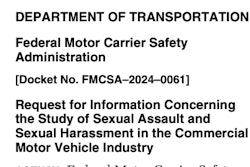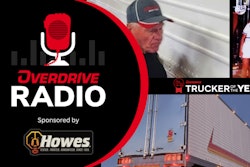The Owner-Operator Independent Drivers Association Wednesday gave Congress an earful about the problems faced by small business trucking during testimony to the House Committee on Transportation & Infrastructure. The hearing, on "How Trucking Supports American Communities," touched on the associations' views on truck parking, insurance, driver training, size and weight restrictions, broker transparency and non-domiciled CDLs.
While OOIDA has given plenty of comment to federal and state governments on all those issues, the organization's petition of the Commercial Vehicle Safety Alliance earlier this month to once again make lacking English proficiency an out-of-service violation, likewise involvement in an ongoing showdown at the Arkansas State House over drivers issed non-domiciled CDLs, ups the ante on those issues.
Pugh's testimony sought to help Congress prioritize the next surface transportation reauthorization legislation, or “highway bill," to "pass the most pro-trucker highway bill in history."
Pugh said "FMCSA issued regulatory guidance in 2019 that created a loophole for states to issue more 'non-domiciled CDLs'," and that his organization is "hearing growing concerns from our members and from truckers at large about the prevalence of drivers using these licenses."

Nondomiciled CDLs, issued to drivers who do not live in the state that issued the CDL, "allow individuals to operate a CMV for work, regardless of whether they are an American citizen or came to the U.S. with a work visa," said Pugh. Yet OOIDA said nobody knows how many of these CDLs have been issued. Overdrive inquired with the Federal Motor Carrier Safety Administration and CVSA -- neither provided a count of how many nondomiciled CDLs there are. The American Association of Motor Vehicle Administrators did get back to Overdrive in time for publication.
"Without this information, we have no way of knowing whether these drivers are operating as safely as [domiciled] CDL drivers or how they may be affecting the compensation of drivers domiciled in the U.S.," Pugh said. Whatever the count, Pugh blamed big carriers for encouraging and exploiting FMCSA's 2019 rule changes.
The "apparent growth" of nondomiciled CDLs "is a result of large carriers recruiting foreign truck drivers to satisfy their insatiable appetite for cheap labor and to avoid addressing their embarrassingly high driver turnover rates," Pugh said. "These carriers have demonstrated they will use every loophole available and peddle false narratives, such as the myth of a driver shortage, to continue bringing the cheapest labor into the industry regardless of possible implications to safety."
Pugh called on Congress to get hard data on the count of non-domiciled CDLs, as well as "how these drivers are being recruited, compensated, treated, and the safety records of carriers utilizing these CDL holders." He questioned why the U.S. even needs non-citizen drivers, "as trucking is currently experiencing over-capacity that limits job opportunities for domestic drivers."
Pugh also urged Congress to ensure enforcement of the English-language requirement -- codified in 49 CFR 391.11(b)(2) -- and noted its efforts to restore English language proficiency as an out-of-service violation. OOIDA's petition to CVSA cites "an alarming amount of unsafe incidents" observed by OOIDA members where "non-domiciled drivers have had issues understanding basic signs or instructions at truck stops, warehouses and fueling stations," The petition points to "known fatal and personal injury collisions and occupational accidents around CMV's as a result of the Commercial Vehicle Driver not being able to comprehend placards, highway signs and emergency instructions."
As reported previously, a 2016 FMCSA bulletin relaxed enforcement of the rules around a lack of English skills, as long as the driver can effectively communicate to the inspector's satisfaction. The move followed a 2015 vote from CVSA members to remove the violations from the out-of-service criteria. OOIDA's petition to CVSA calls for that to be reversed.
[Related: Do drivers need to learn English?]
When Congressman Dave Taylor (R-Ohio) asked the committee's panel members if they supported a "requirement that CDL drivers be able to read and speak English," all five in the panel raised their hands in the affirmative -- Pugh, former Truckload Carriers Association Chairman John Elliott of Load One, a member of a shippers coalition, a rep of the American Farm Bureau Federation and one from the Teamsters.
CVSA told Overdrive it did get OOIDA's petition and "refers all Issue/Requests for Action to the appropriate committee for discussion."
In this particular case, the CVSA rep added, "the request has been put on the agenda for our Driver-Traffic Enforcement Committee meeting in late April, as part of our spring Workshop. CVSA is currently gathering relevant information in advance of the meeting, to best prepare our members to have their discussion. They will discuss the issue and potentially make a recommendation to our Board of Directors for consideration."
If the board agrees, the proposal would go to a vote among 70 North American states, provinces and territories, for approval in the fall. Those 70 parties include Mexican and Canadian states as well as the U.S. members.
Asked if CVSA had any comment on OOIDA's claim that CVSA's 2015 vote to drop enforcement of ELP as an out of service violation had been bad for safety, the CVSA rep said the following:
It’s important to note that enforcement of the English Language Proficiency requirement in 391.11(b)(2) has not stopped. It remains a violation that is documented when appropriate. It is simply not currently considered an out-of-service condition. CVSA is working to gather information for our members to have a discussion in April about the potential safety impacts and identify the appropriate next steps.
While Pugh testified to Congress on Wednesday, House members made note of a recent Executive Order from the White House designating English as the U.S.'s official language.
[Related: What truckers want DOGE to tackle]













